Dark Imperium: Plague War Read online
Backlist
More Warhammer 40,000 stories from Black Library
• DARK IMPERIUM •
Guy Haley
Book 1: DARK IMPERIUM
BLOOD OF IAX
A Primaris Space Marines novel
Robbie MacNiven
OF HONOUR AND IRON
A Space Marine Conquests novel
Ian St. Martin
BLADES OF DAMOCLES
A Space Marine Battles novel
Phil Kelly
THE PLAGUES OF ORATH
A Space Marine Battles novel
Steve Lyons, Cavan Scott & Graeme Lyon
• THE CHRONICLES OF URIEL VENTRIS •
A six-volume series of novels by
Graham McNeill
NIGHTBRINGER
WARRIORS OF ULTRAMAR
DEAD SKY, BLACK SUN
THE KILLING GROUND
COURAGE AND HONOUR
THE CHAPTER’S DUE
VEIL OF DARKNESS
An audio drama featuring the Ultramarines
Nick Kyme
The Beast Arises
1: I AM SLAUGHTER
2: PREDATOR, PREY
3: THE EMPEROR EXPECTS
4: THE LAST WALL
5: THRONEWORLD
6: ECHOES OF THE LONG WAR
7: THE HUNT FOR VULKAN
8: THE BEAST MUST DIE
9: WATCHERS IN DEATH
10: THE LAST SON OF DORN
11: SHADOW OF ULLANOR
12: THE BEHEADING
Space Marine Battles
WAR OF THE FANG
A Space Marine Battles book, containing the novella The Hunt for Magnus and the novel Battle of the Fang
THE WORLD ENGINE
An Astral Knights novel
DAMNOS
An Ultramarines collection
DAMOCLES
Contains the White Scars, Raven Guard and Ultramarines novellas Blood Oath, Broken Sword, Black Leviathan and Hunter’s Snare
OVERFIEND
Contains the White Scars, Raven Guard and Salamanders novellas Stormseer, Shadow Captain and Forge Master
ARMAGEDDON
Contains the Black Templars novel Helsreach and novella Blood and Fire
Legends of the Dark Millennium
ASTRA MILITARUM
An Astra Militarum collection
ULTRAMARINES
An Ultramarines collection
FARSIGHT
A Tau Empire novella
SONS OF CORAX
A Raven Guard collection
SPACE WOLVES
A Space Wolves collection
Visit blacklibrary.com for the full range of novels, novellas, audio dramas and Quick Reads, along with many other exclusive products
Contents
Cover
Backlist
Title Page
Warhammer 40,000
Chapter One
Chapter Two
Chapter Three
Chapter Four
Chapter Five
Chapter Six
Chapter Seven
Chapter Eight
Chapter Nine
Chapter Ten
Chapter Eleven
Chapter Twelve
Chapter Thirteen
Chapter Fourteen
Chapter Fifteen
Chapter Sixteen
Chapter Seventeen
Chapter Eighteen
Chapter Nineteen
Chapter Twenty
Chapter Twenty-One
Chapter Twenty-Two
Chapter Twenty-Three
Chapter Twenty-Four
Chapter Twenty-Five
Chapter Twenty-Six
Chapter Twenty-Seven
Chapter Twenty-Eight
About the Author
An Extract from ‘Blood of Iax’
A Black Library Publication
eBook license
It is the 41st millennium. For more than a hundred centuries the Emperor has sat immobile on the Golden Throne of Earth. He is the Master of Mankind by the will of the gods, and master of a million worlds by the might of His inexhaustible armies. He is a rotting carcass writhing invisibly with power from the Dark Age of Technology. He is the Carrion Lord of the Imperium for whom a thousand souls are sacrificed every day, so that He may never truly die.
Yet even in His deathless state, the Emperor continues His eternal vigilance. Mighty battlefleets cross the daemon-infested miasma of the warp, the only route between distant stars, their way lit by the Astronomican, the psychic manifestation of the Emperor’s will. Vast armies give battle in His name on uncounted worlds. Greatest amongst His soldiers are the Adeptus Astartes, the Space Marines, bio-engineered super-warriors. Their comrades in arms are legion: the Astra Militarum and countless planetary defence forces, the ever-vigilant Inquisition and the tech-priests of the Adeptus Mechanicus to name only a few. But for all their multitudes, they are barely enough to hold off the ever-present threat from aliens, heretics, mutants – and worse.
To be a man in such times is to be one amongst untold billions. It is to live in the cruellest and most bloody regime imaginable. These are the tales of those times. Forget the power of technology and science, for so much has been forgotten, never to be re-learned. Forget the promise of progress and understanding, for in the grim dark future there is only war. There is no peace amongst the stars, only an eternity of carnage and slaughter, and the laughter of thirsting gods.
Chapter One
Chronicus Novae Imperia
Weak light bobbed through pitchy black, casting a pale round that grew and shrank upon polished blue marble quarried on a world long ago laid waste. The hum of a grav motor sawed at the quiet of the abandoned hall, though not loudly enough to banish the peace of ages that lay upon it. The lamp was dim as candlelight, and greatly obscured by the iron lantern framing it. The angles of the servo-skull that bore the lantern further cut the glow, but even in the feeble luminance the stone gleamed with flecks of gold. The floor awoke for brief moments at its caress, glinting with a nebula’s richness, before the servo-skull moved on and the paving’s glory was lost to the dark again.
The lonely figure of a man walked at the edge of the light, sometimes embraced by it completely, more often reduced to a collection of shadows and mellow highlights at its edge. The hood of his rough homespun robe was pulled over his head. Sandals woven of cord chased the light at a steady pace. The circle of light was small, but the echo of the man’s footsteps revealed the space it traversed as vast. Less could be discerned about the man, were there anyone there to see him. He was a priest. Little else could be said besides that. It would certainly not be obvious to a casual observer he was militant-apostolic to the Lord Commander. He did not dress as men of his office ordinarily would, in brocade and jewels. He did not seem exalted. He certainly did not feel so. To himself, and to those poor souls he offered the succour of the Emperor’s blessing, he was simply Mathieu.
Mathieu was a man of faith, and to him the Space Marines seemed faithless, ignorant of the true majesty of the Emperor’s divinity, but the Mortuis Ad Monumentum had the air of sanctity nevertheless.
Mathieu liked it for that reason.
Beyond the slap of the priest’s shoes and the whine of the skull, the silence in the Mortuis Ad Monumentum was so total, the sense of isolation so complete, that not even the background thrum of the giant engines pushing the Macragge’s Honour through the warp intruded. The rest of the ship vibrated, sometimes violently, some
times softly, the growl of the systems always there. Not where the priest walked. The stillness of the ancient hall would not allow it. Within its confines time itself held its breath.
Mathieu had spent his quieter days exploring the hall. Its most singular features were the statues thronging the margins. They were not just in ones or twos, effigies given space to be walked around and admired, nor were they ensconced in alcoves to decorate or commemorate. No, there were crowds of stone men, in places forty deep, all Adeptus Astartes in ancient marks of armour. It may be that they were placed with care once, but no longer, and further into the hall, the more jumbled their arrangements became. The hall had been breached in days gone by, and the statues destroyed. Untidy heaps of limbs were bulldozed carelessly aside and ugly patching marked wounds from ancient times.
The warriors remembered by the statues had died ten thousand years before Mathieu’s birth. Perhaps they had even fallen in the Emperor’s wars to create the Imperium itself. Such an incredible length of years, hard to comprehend, and yet now the being who had led these self-same dead men commanded the ship again.
It dizzied Mathieu that he served a son of the Emperor. He could not quite believe it, even after all that had happened, all that he had seen.
Mathieu stopped in the dark where a group of statues huddled together. White stone glowed grey in the gloom. He had the terrifying notion that they had come alive and gathered to block his path, a phalanx of ghosts angered by profanity. He put aside the thought. He ignored the cold hand of fear creeping up his back. He had come off course, nothing more. It was easy enough to get lost in a hall half a mile wide and almost as long.
His servo-skull bore a large HV upon its forehead. By the letter V alone he called it. He could not bring himself to refer to it by her name.
‘V,’ he said. His voice was pure and strong. It cut the shadows and frightened back the dark. Mathieu was an unimposing man, young, slight, but his voice was remarkable; a weapon greater than the worn laspistol he carried on his left hip, or the chainsword he bore into battle. Loud and commanding before his congregations, it seemed tiny in the face of the dead past, but like a silver bell chiming deep in winter-stilled woods, it was clear and bright and lovely.
V emitted a flat, static-laced melody of acknowledgement.
‘Ascend five feet. Elevate lamp, pan left to right.’
The skull’s motors pulsed. It rose up into the high voids of the monumentum. The light abandoned Mathieu, angling instead for the still figures surrounding him. Stone faces leapt from the dark, as if snatching the chance to be remembered, quickly drowning again in the black as V turned away. For a moment Mathieu’s fear came back. He did not recognise where he was, until V’s pale lamplight washed over a Space Marine captain of some unremembered era, the right arm held so proudly aloft broken off at the elbow. This warrior he recognised.
Mathieu breathed in relief. ‘Descend to original height. Rotate lantern downwards to light my way. Proceed.’
V voiced its fractured compliance. There were pretensions to musicality in the signal, but the limited vox-unit was fifth hand at least, scavenged like all V’s other fittings, and overuse had blunted its harmonies.
‘Proceed to the hermitage, quickly now. My time for this duty is running out.’
V banked around and swept onwards. Mathieu picked up his pace to keep up.
The Adeptus Astartes pretended to disdain worship. It was well known among the Adeptus Ministorum that they did not regard the Emperor as a god. Mathieu had known this all through his calling. The truth had proved to be not so simple. On the ship there were many shrines, decorated lovingly with images of death, and containing the bones of heroes in reliquaries that rivalled those of the most lauded saint in their ostentation. The Ultramarines’ cult was strong, though they did not worship. In chapels that denied religion their skull-masked priests protested loudly about the human nature of the Emperor and the primarchs while venerating them as gods in all but name. Their practice of honour, duty and obedience was conducted with a fanatical devotion.
There was an element of wilful blindness to their practices, thought Mathieu.
The way the Adeptus Astartes reacted to Roboute Guilliman bordered on awe. From the beginning Guilliman had warned Mathieu himself not to be worshipful, that he was not the son of a god. The priest had witnessed how irritated the primarch became with those who did not heed his words. And yet, these godless sons of his looked upon him, and they could barely hide their fervour.
Mathieu did as he had been told. He affected to see the man Guilliman wished to be, but his familiarity with the primarch was largely an act. Mathieu did revere the primarch, sincerely and deeply.
Previous militant-apostolics had carved themselves out a little realm in Guilliman’s palace spire atop the giant battleship. The position came with appropriately luxurious quarters. Some time before Mathieu’s tenure the largest room had been converted into a chapel of the Imperial Cult. It was gaudy, too concerned with expressions of wealth and influence and not faith. Mathieu had done his best to make it more austere. He removed some of the more vulgar fixtures, replaced statues of ancient cardinals with those of his favourite saints. There had been a sculpture of the Emperor in Glory standing proudly, sword in hand, upon the altar. Mathieu had replaced that with an effigy of the Emperor in Service; a grimacing corpse bound to the Golden Throne. Mathieu had always preferred that representation for it honoured the great sacrifice the Emperor made for His species. The Emperor’s service to mankind was so much more important than His aspects as a warrior, ruler, scientist or seer. Mathieu always tried to follow the example of the Emperor in Service, giving up what little comfort he had to aid the suffering mass of humanity.
The chapel was tainted by the dishonesties of holy men. He preferred to lead worship with the ship’s bonded crew in their oily churches. He maintained the private chapel only because the display was expected of him. He rarely prayed there.
For his private devotions he came down to this deserted cult monument of irreligious men.
At the back of the hall was a small charnel house, where the stacked skulls of fallen heroes were cemented in grim patterns. The dust lay thick on all its decoration when Mathieu had discovered it. Nobody had been there for a long time.
Beneath the eyeless stares of transhuman skulls, he had set up a plain wooden altar, this also bearing an effigy of the Emperor in Service. Arrayed around it were lesser statues of the nine loyal primarchs, as could be found in any holy place. That representing Roboute Guilliman was three times the size of the others. Mathieu genuflected to both Emperor and His Avenging Son, though the real Guilliman might well shoot him for doing so.
He knelt awhile and prayed to the statues, the Emperor first, His sons and then finally to Guilliman. He stood and took from a large ammunition box thirty-six candles which he added to the racks of hundreds around the periphery of the room. When the candles were in place upon their spikes, he ignited a small promethium flame, and from it lit the wicks one by one, whispering solemnly over each.
‘Emperor watch over you,’ he said. ‘Emperor watch over you.’
Each candle represented the wish for a prayer from a menial somewhere, those ordinary folk who made up the majority of the Imperial citizenry yet otherwise had no voice. When someone asked him for the blessing of light, Mathieu never refused, no matter how high or low, but promised to burn a candle for every request. There were so many pleas, so many in pain, even within the small world of a starship, that he could not possibly hope to keep his vow. In the end he had taken on aid, as his deacons insisted he should. Having always denied himself servants or servitors he was troubled by how easily he had got used to them. He never wanted to become like other high churchmen, with bloated households thousands strong, and feared this was but the first step on that road.
When he found himself taking the servants for granted, he had taken penance, str
aining the capacity of his auto-flagellator to punish himself. After his scourging he had prepared this hermitage for himself, clearing it out with his bare hands, washing the floors, crafting the objects of worship. When he had done, he had reverently set up an identical rack of candles to show his sincerity, so now every lost soul had two candles to burn for them; one above lit by his servants, and one below lit by himself. His hermitage was dark when he arrived. He doused the candles when he left and he relit them every single time he went within, until they burned down to stumps. There were always more to replace them.
‘The Lord Guilliman chose me for my humility,’ he said to himself. With one unwavering hand he touched the promethium torch to every stick of wax. His other hand was clenched so tightly in his robes his knuckles glowed white in the candlelight. His auto-flagellator ran at a setting of mild agony. He let the pain thrill his body, purifying him of his selfish thoughts. ‘O Emperor, do not let me lose myself in this office. Do not let me damn myself by forgetting Your grace and Your purpose for me. Let me be free of pride. Let me be pure of purpose. Let me help Lord Guilliman to see the truth of Your light. Help me, O Master of Mankind.’
After an hour, he was finished. He took out a sanctus-astrogator from his robes and let it find the likely position of Terra for him. Whether it truly worked in the warp he did not know, yet he followed its suggestion, and genuflected in the direction of man’s ancestral home, where the Emperor dwelled in majestic pain.
That done, he went to his desk.
He lit six large candles lodged into the open tops of a pair of skulls. They had belonged to the faithful dead, martyred in anonymity by the marauders of Chaos. He thanked each of them for providing him light in the dark. Then he sat down and opened the leather tome he had upon the desk. The paper was smooth and creamy, far better than any he had used before. There were some benefits to being the primarch’s tool. The book fell open at the title page, displaying the legend The Great Plague War. Mathieu turned the pages, looking upon those chapters he had already finished but whose illuminations remained rough sketches. Before committing his thoughts to this history, he worked and reworked them in chapbooks, until he deemed them ready for this first drafting. Today was a momentous day. The next part of his testament was finished and could be laid down for posterity.

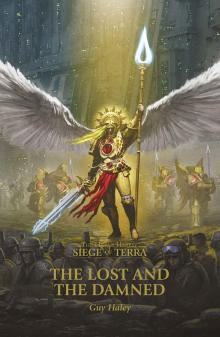 The Lost and the Damned (The Horus Heresy Siege of Terra Book 2)
The Lost and the Damned (The Horus Heresy Siege of Terra Book 2)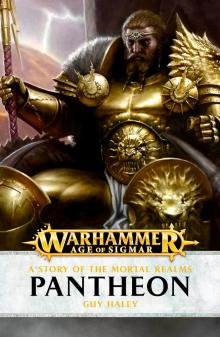 Pantheon
Pantheon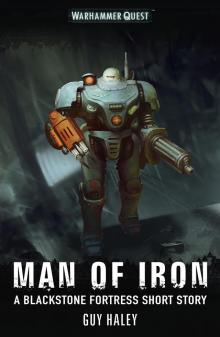 Man of Iron
Man of Iron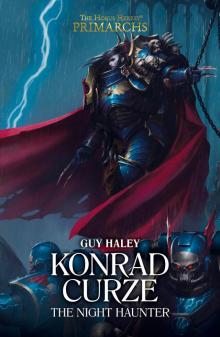 Konrad Curze the Night Haunter
Konrad Curze the Night Haunter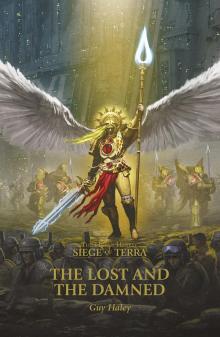 The Lost and the Damned
The Lost and the Damned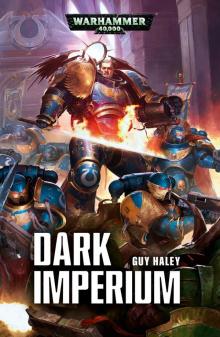 Dark Imperium
Dark Imperium Hoppo's Pies
Hoppo's Pies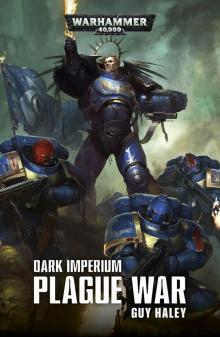 Dark Imperium: Plague War
Dark Imperium: Plague War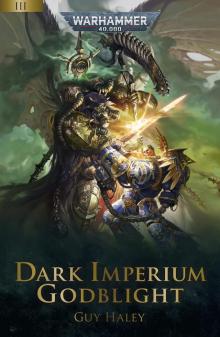 Dark Imperium: Godblight
Dark Imperium: Godblight Crash
Crash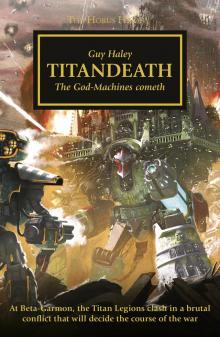 Titandeath
Titandeath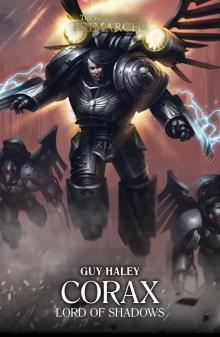 Corax- Lord of Shadows
Corax- Lord of Shadows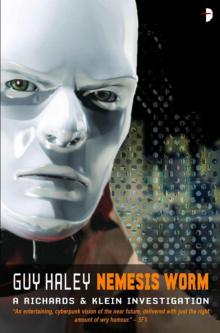 The Nemesis Worm
The Nemesis Worm Wolfsbane
Wolfsbane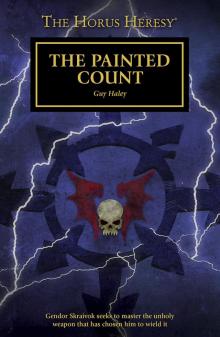 The Painted Count
The Painted Count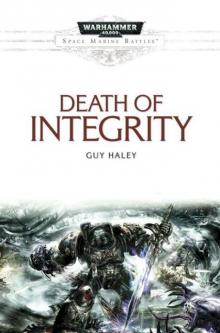 The Death of Integrity
The Death of Integrity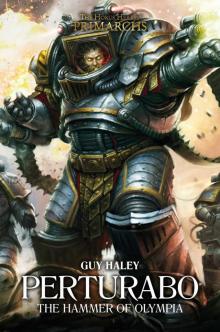 Perturabo: Hammer of Olympia
Perturabo: Hammer of Olympia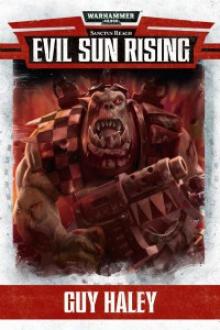 Evil Sun Rising
Evil Sun Rising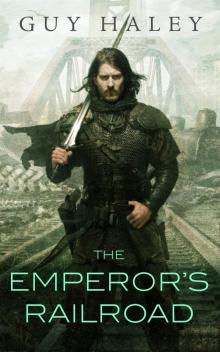 The Emperor's Railroad
The Emperor's Railroad Shadowsword
Shadowsword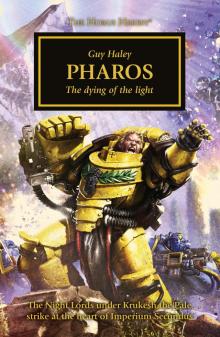 Pharos
Pharos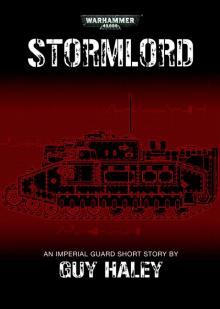 Stormlord
Stormlord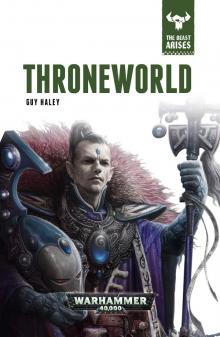 Throneworld
Throneworld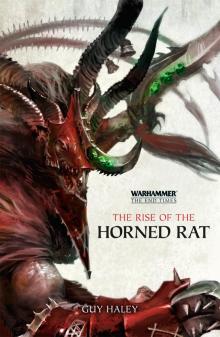 The End Times | The Rise of the Horned Rat
The End Times | The Rise of the Horned Rat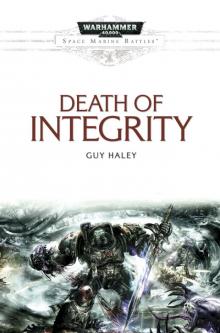 Death of Integrity
Death of Integrity Omega Point
Omega Point Omega point rak-2
Omega point rak-2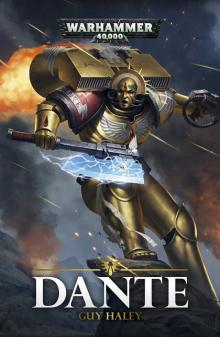 Dante
Dante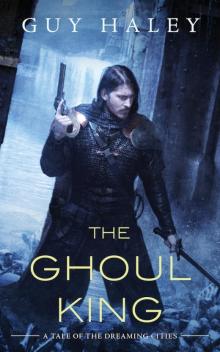 The Ghoul King
The Ghoul King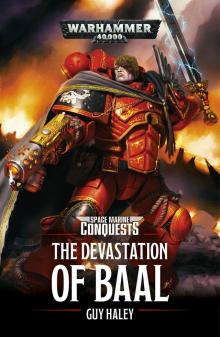 The Devastation of Baal
The Devastation of Baal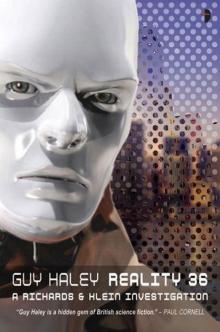 Reality 36: A Richards & Klein Novel
Reality 36: A Richards & Klein Novel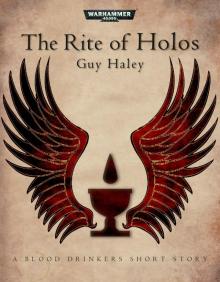 The Rite of Holos
The Rite of Holos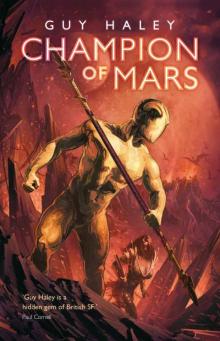 Champion of Mars
Champion of Mars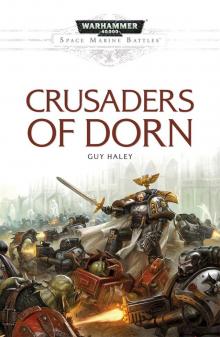 Crusaders of Dorn
Crusaders of Dorn Baneblade
Baneblade